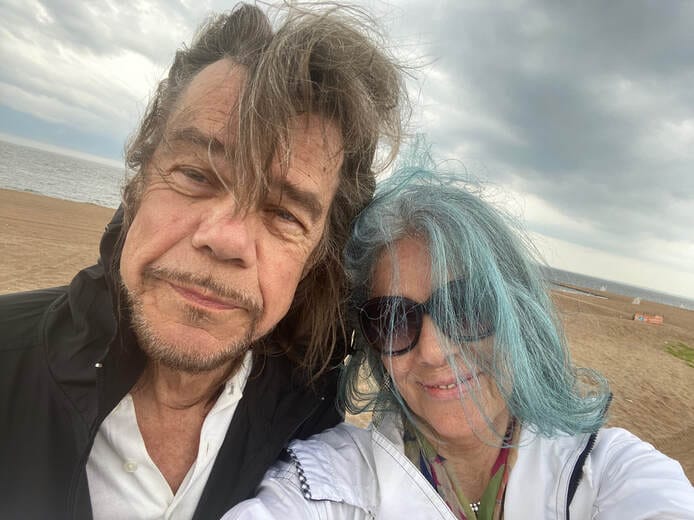David Johansen Could Use (Your) Protection from the Cold

You think I'm a whore
But I got a heart of gold
You're lockin' your doors
You're leavin' me, out in the cold
Well I've been bought and baby
I've been sold and I
Need protection from the cold
“Heart of Gold,” by David Johansen
This post is to elicit your support for David Johansen, and more specifically for the fund that was recently launched on his behalf.
The buoyantly cranky, ever-charismatic, sometime New York Dolls frontman (equally known for his solo career, including the Buster Poindexter incarnation and the folk-centric Harry Smiths band), has been quietly enduring a stubborn cancer for some years.
Recently came the deeply unwelcome news, from wife Mara Hennessey and David's stepdaughter Margaret Hennessy, that the long-festering malady that effectively took him offstage five years ago and grew more dire as Stage 4 brain cancer, was worsened by a fall that broke his back in two places. As of the latest news, he was surgically repaired but effectively bed ridden, and as medical costs mount his loved ones have started a funding site (in concert with the musicians’ charity Sweet Relief) to which—this being my point today—all who read this are encouraged to donate.
I did my admittedly small part for that and now await a nifty tee-shirt from the charity.
With hopes of bolstering the message, the below expressions of fan-boy-adjacent anecdotes may portray just part of the compelling variety of this remarkable human, who thankfully is as beloved as ever.
There’s an old saw that is said to have been uttered first by schoolteachers—"The good ones you keep in your head; the bad ones you keep in your heart.”
David Johansen has always been in that latter category for me. Of course he’s not “bad” in any conventional sense, but he’s always had a jauntily piratical edge, a thinking man’s wise-guy emanation. In dealing with journos he conveys a sense that rock star and rock chronicler are engaged in the same admittedly silly game of celebrity. (One exception may be that he eschewed snark with the likes of Paul Nelson, not only his most profund critical “appreciator” of music--as David said at Paul’s memorial--but the sometime A&R man who shepherded The Dolls’ first record deal. And who--solely in small type in the margin–mentored yours truly at Rolling Stone.) David has always led with self-deprecation; I recall listening to a visit he made to a Long Island FM disk jockey who began with, “You’ve been doing this professionally since…” but David didn’t let him finish: “Am I doing this professionally?”
From the earliest days as the Dolls frontman, his persona was slathered with irony, and his latter-day personae as Buster Poindexter, tuxedoed cabaret bandleader, or still later as a wide-ranging musical archivist leading The Harry Smiths, were likewise nuanced with an amiable snicker that lets the audience in on the joke.
I know him mostly from the least well-fitting (for him especially) of his rock lives, as mainstream (-ish) rocker “David Johansen.” He has often cited that he signed on for a one-off show gig as a rent-payer and then didn’t come home for eight years. He saw only middling success, with much of his touring as opener for “heavy mental” bands whose audiences “looked at me like a bug.” Before crowds of several thousands, Nelson pithily observed, “the Dolls' particular insular magic somehow became diluted.” "David Johansen" scaled up more readily, offering songs and energy empitomized by the propulsiveness of his sorrowing but chest-thumping “Donna.”
https://www.youtube.com/watch?v=xC4FxHfa92M--
The quirkiness and smarts that made him well-loved as an insiders’ phenomenon wasn’t built to reach the cheap seats. But soon enough the sudden commercial success of fare like Poindexter’s “Hot Hot Hot” hit, the song—"heard at weddings bar mitzvahs and Six Flags” as he has complained—became a monkey on his back. (He wrote the striking verse atop this post well before such success, and no one paying attention would ever think of him as any sort of “whore”—but there is a poignancy in his ambivalence about the show business trade he’s worn like corporal mortification for so long.)
Thus it was a brilliant stroke for him to take his sporadic turns before the aficionados at the posh Café Carlyle and infuse them with the heartfelt energy of the best of said “David Johansen.” Super-fan Martin Scorsese teamed up with co-director David Tedeschi, plus Mara and filmmaker daughter Margaret, to mount the filmed boite sets of “Personality Crisis: One Night Only” as a mash-up of the Dolls days (notably the classic power-punk track that lent the film its title), with a jigger of Aznavour, plus that essential David Johansen guy, and proffer it to an intimate, loving audience. The film interspererses absorbing, often funny history and `characters' with the singer's trademark, theatrically louche but compellingly sincere presentation. The almost too pretty visage of the old days has creased into a magnificent ruin located somewhere between Salvador Dali and the Wolfman, and his consciously stagey casualness keeps his ironic distance always in the forefront. “Where am I” he asks early on in the doc, “Who am I?”
Clearly he was glad, after years of “schlepping in so many conveyances” to beer-soaked venues, to be on the Upper East Side in a chamber as enfoldingly classy as the room song stylist Bobby Short owned for years.
Having said at the outset that David is “bad” only in the strict sense that apocryphal compassionate schoolteacher speaks of, his stepdaughter charged with drawing him out lovingly bemoans that in a conversation he oscillates between a slightly brooding, even touchy silence and conversely, speaking right up out of turn. And if he directs some bluster or sarcasm your way, it doesn’t come out of unkindness but a kind of candid (over-) directness. As noted by Robert Christgau, who favored him for the revelatory kick in the ass he's been since earliest days, he’s “the kind of person you forgive in advance for hurting you.”
So, some rock and roll memories of the ordinary, if personal sort...
Item: One evening I ran into him not long after posting a thoroughly warm, not to say full-stan, review of a show he gave in Manhattan’s Palladium in mid-August of 1979. It was not long after the night I ran into him in the noisy hub-bub of the post-punk-friendly confines of Hurrah’s rock venue on the Upper West Side. “Nice review,” he stated, his grin drifting towards the unstated but imaginable rim shot, “For an eager amateur.” He then instructed with theatrical pique, out loud, “Those were not platform heels—those were Beatle boots.” (The accent went more gravelly with each succeeding word; of couture, even rock couture, I knew as little as your granny.)
Any alienation produced by this clarification was soon settled over a couple drinks, and the evening ramped on, Johansen blessed his flock and tossed off jibes in his mellow growl. He knew what hidey-holes the club offered for moments of privacy, and at some stage Elliott Murphy, another Nelson discovery at that point living down the “next Dylan” tag, joined in the hang.
Item: Cut to some years later and on what had become regular trips from N.Y. to Cali for stories, I ran into fellow hotel guest David at the Sunset Marquis as, around cocktail hour, the poolside populated, and there was David, tee shirt in some challenging hue draped over his bony frame, complaining of a stigmatic spider bite on his arm. (His face in repose often has the look of a well-tested saint, some sort of cosmic joke on the Big Man Upstairs but apt to his love of music as leading us to the devotional side of life.)
Unsurprisingly, one supposes, we fell into beer-tasting mode once more, and the rest of the memory is indistinct. But as his essential humanity would dictate, it was decided near closing time we’d each call home before investigating some kind of nightcap his mini-bar might provide. I heard him start his call in his warmly effusive if shambolic way; when I returned fifteen minutes later the tea kettle in the galley kitchen was giving off a marrow-stabbing shriek, unheard by David some few feet away. It took only a moment to realize the evening was done—Noel Coward had given way to Peter O’Toole– and our man, my hero in so many ways, had successfully targeted a half-twist plunge onto his bed and was sprawled slumberingly supine. One shoe (this time I won’t try to name the style) was mostly shucked, and his street clothes, while in slight disarray, could serve, I felt sure, as sufficient barrier to the cooling night. (Goodnight, one thinks, and flights of angels sing thee to thy rest.)
If these sub-parables have a direction, it’s to seek a path to showing how he lived through—and rises above—the kicks and slaps summoned by one of his well-lived mottos—“Nothing recedes like success.” One has come to cherish each of the three faces of David—the gender-fluid Dolls cosplay, the champagne Buster years, and finally the turn-of-the-millennium moment when his crack Harry Smiths band delivered what has been called the front-porch demeanor of the titular Smith’s great folk song catalogue, including the likes of “Oh Death”:
What is this that I can't see
With icy hands taking hold on me…
The children pray the preachers preach
Time and mercy is out of your reach
Item last: It was well after that third phase when he flew west for an event honoring the Smith source material, and I attended a meet and greet moment in a West Side hotel. Entering the room, I actually wondered if, given the entropic disorder of earlier meetings, David would still reveal that soulful self that throbs under the sometimes-daunting carapace. But when we made eye contact he gave that unduplicatable grin, containing mirth and warmth along with the sardonicism. He stepped in to drape his ever-spindly arms over me, a lazing, lingering hug. I’m grateful for it as I was that day. It spoke of a grace he has always possessed.
And now we’re all worried for him. But there’s something each of us can do, and I’ll say one more time, the need is real and the people in need have a nobility we must recognize and support.
Useful links:
Sweet Relief Musician’s Fund:
https://www.sweetrelief.org/davidjohansenfund.html
“Personality Crisis: One Night Only”:
https://www.amazon.com/gp/video/detail/amzn1.dv.gti.8dc46381-5b6f-418a-94c0-bdb83192e9b5?autoplay=0&ref_=atv_cf_strg_wb


Comments ()